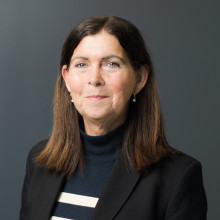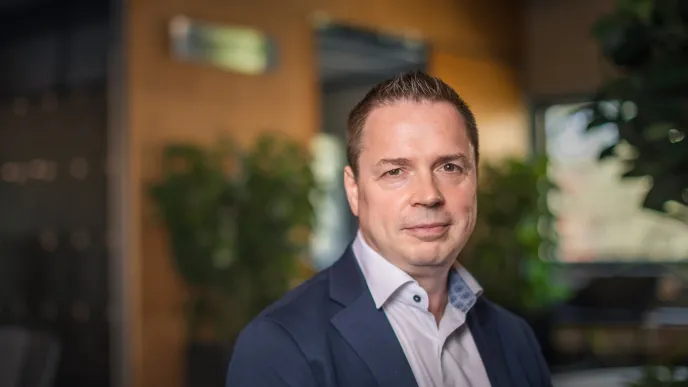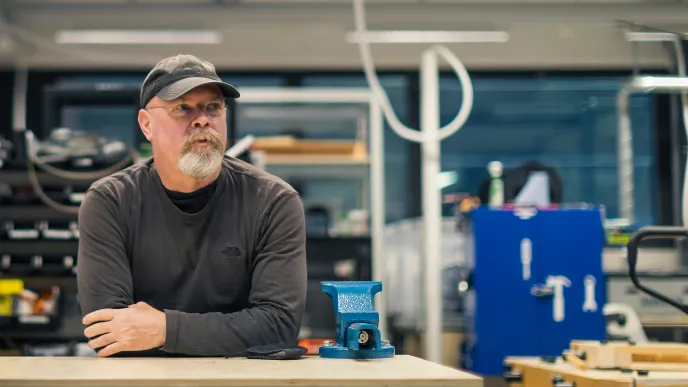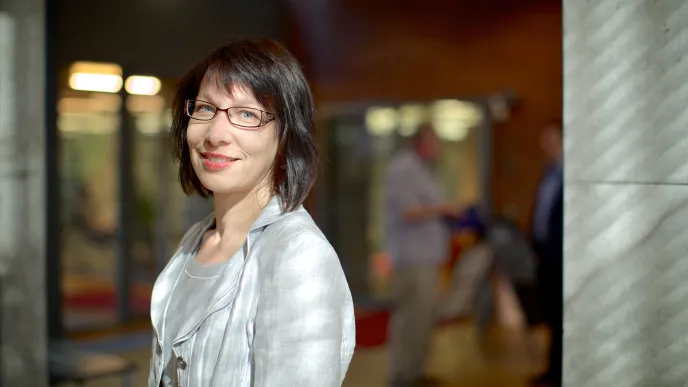According to LUT University’s new HRD vice rector Truus Poels, rhythm in music and organizations have much in common.
“Everything has a rhythm: the day, the night, the seasons. If we do sports, we start by warming up and finish by cooling down – otherwise it's not healthy. There’s also a rhythm for a successful organizational change.”
Since her childhood, Poels has been fascinated by music. Although her career took another direction, her love for music never faded. Poels even used musical concepts in her doctoral research in the field of administrative and organizational science. Afterwards, she founded the Innovation Platform Rhythmics of Organizational Change which conducts research and inspires business leaders around the world.
“Sometimes I view myself as a conductor of an organization trying to get people to listen to each other, resulting in an excellent concert of great harmony,” Poels smiles.
Truus Poels’ position as vice rector of human resource development is the first of its kind in any Finnish university. Even in universities elsewhere in Europe, such positions are rare.
“However, both human resource management (HRM) and human resource development (HRD) appear to be growing in importance in European universities, and for good reasons.”
According to Poels, there’s a clear difference between HRM and HRD. Human resource development focuses on developing “the future happy workforce” and is closely tied with strategy. Human resource management, on the other hand, is more about management in the present.
“HRD helps employees to strengthen and grow their abilities, skills, and knowledge which makes them better at what they do. In return, the process enhances the whole organization's efficiency,” Poels describes.
Truus Poels
- HRD vice rector of LUT University, started 1 April 2023
- Responsible for further improvement of work culture, leadership, and processes.
- Lives in Lappeenranta, Finland, and Ospel, the Netherlands.
- Family: husband and three adult children
- Doctor of Administrative and Organizational Science, Master of Laws, Bachelor of Human Resources and Labor Relations
- Professor at Webster University, USA, and the European Institute for Procurement Management, France/China
- Research interests: leadership, organizational change and development, human resources management, organizational behavior, personal and professional development, innovation
- Founder and chairperson of the Innovation Platform Rhythmics of Organizational Change
- Board member of Eduquaat (organization with seven primary schools, NL) and Webster Centre for Creativity and Innovation, Geneva, Switzerland
- Hobbies: activities with family and friends, running, music (especially playing the violin), travelling, reading, gardening

Passion for helping people and organizations
Poels has worked for 35 years in human resource development – in industry, governmental organizations, healthcare, pharmaceutical industry, consultancy, judicial institutions and in military organizations, just to name a few. She has a multidimensional and international background and vast experience in both corporate (HRM & HRD) leadership positions and scientific research.
“Sometimes people ask me why I couldn’t choose one or the other. My answer is that I did choose. I picked them both,” Poels laughs.
During her varied and successful career, people have been the most important piece of the puzzle driving Poels forward.
“I enjoy interacting with different people and understanding them, their ambitions and concerns. Helping people and organizations is my passion.”
Poels prefers the speak about people, not human resources or employees. As a people person, she finds the word “resources” distancing and objectifying.
“To me, people are active subjects.”
Recently, she was especially inspired by the students on her business ethics course at Webster University. On the course, she dealt with complex and ambiguous business cases with students from all over the world – from Venezuela to Uzbekistan and from Zimbabwe to Nepal.
“The level of mutual trust during these sessions was inspiring. It made me very proud and happy. Also, it gives me trust in the future of the world.”

Truus Poels Q&A
1. If anything was possible, what would you do?
“I would like to contribute to healthy organizations and healthy people and ban toxic leadership and toxic organization cultures.”
2. Tell us something others may not know.
“When I was young, I wanted to be a music conductor. However, it was not possible for a woman at that time.”
3. How do you balance work and free time?
“To me, balancing work and personal life is a challenge, so monitoring the work-life balance is important. I like playing the violin because when you are playing, you only listen to the music and don’t think about anything else.”
4. Why do organizational changes fail?
“The problem is that we don’t have and/or take time to evaluate and learn as a company. That means we make the same mistakes every time.”
Coping with pressure, valuing the people
In a university’s daily operations, workloads are heavy and pressures run high. Researchers push themselves to publish articles and achieve high rankings. Students, on the other hand, are burdened by expectations of top grades and quick graduation. Moreover, the employees in university services experience the difficulty of supporting management and staff with limited resources.
“Many organizations face a volatile environment in which change is constant. We must understand and respect that. For an organization, change means people need to adapt constantly. HRM should encourage it and make it more acceptable for people.”
Poels finds the pressure mostly unavoidable. The key is learning how to cope with it. In her experience, there’s much that can be done.
“The first thing is putting people first: listening to their stories, involving them, looking at how they feel and what they want now and for the future. Are they happy? Do they feel safe? Organizations should value and respect their people,” she points out.
Fortunately, there are also positive signs coming from the world of work. According to Poels, more and more organizations are taking a broader view on people's potential and making serious efforts to ensure the best possible employee experience.
“The best way to have and get happy employees is to attract people who fit the organization’s culture and mission. It's a difficult job in which management and HR both need to participate.”
The most topical themes in HRD
1. Investing in employee development
The best future strategy for an organization is investing in the personal development of its people. Fascinating and meaningful work, good growth opportunities, being appreciated and being able to participate in decision-making make people want to stay in their job. Meaningful work is related to motivation and work enjoyment.
2. Vitality and employability
Organizations need policies to prevent an unhealthy climate and increasing pressure at work. These policies also need to be incorporated into daily operations. Vitality means people find meaning in their work and feel connected with each other and the organization. It also means people can grow and make a full use of their talent.
3. Optimizing the employee experience
What matters the most, is strengthening the sense of solidarity. To ensure this, organizations need a corporate culture in which people feel at home and safe and can pursuit the same values, norms and goals. Currently, the focus is shifting from attracting new talents to retaining current employees.
4. Perfecting hybrid working
Organizations need to include hybrid working in their corporate culture. Close-knit teams of people who know each other, find each other and are there for each other are more important than ever, even if the teams work in different time zones and locations.
For many organizations, hybrid work is still very new, involving misunderstandings and requiring discussion, guidelines and training.
Source: LUT University’s HRD vice rector Truus Poels

The key to LUT’s success is authenticity
Truus Poels chose to work at LUT University for two reasons. Again, it was the people who first inspired her.
“I’ve had warm encounters with kind, involved and experienced people which has given me a very good feeling about the job. That's very important to me,” she says.
In addition, she was impressed by LUT’s combination of technology and business which is rare in European universities. It’s also an asset in attracting more foreign students and researchers and becoming an even more international university.
“LUT University has a strong growth strategy, which I’m going to support by creating and implementing a new HR strategy for international expansion through developing leadership and culture. My work is about increasing both the organization’s growth and people’s well-being.”
According to Poels, LUT is going to succeed in competition with other European universities by being authentic. The best ways to ensure authenticity is to value current employees and find the right fit between new employees and the organization’s culture.
“You need be the best version of yourself. This way, you’ll be unique and the success will follow.”
LUT University is known for its good working atmosphere and low hierarchy. As a highly international community of over 90 nationalities, the fit between the Finnish culture and other cultures is essential.
“A low hierarchy is a part of the Finnish culture. To integrate international students, it’s important to understand how it might impact their sense of well-being and interaction with others.”
As an international expat herself, Poels wants to help her new colleagues to achieve not only organizational ambitions, but also personal ones. One of her latest ambitions is getting to know Finland for the first time.
“My husband and I like adventures. We are very much looking forward to our time in Finland.”








